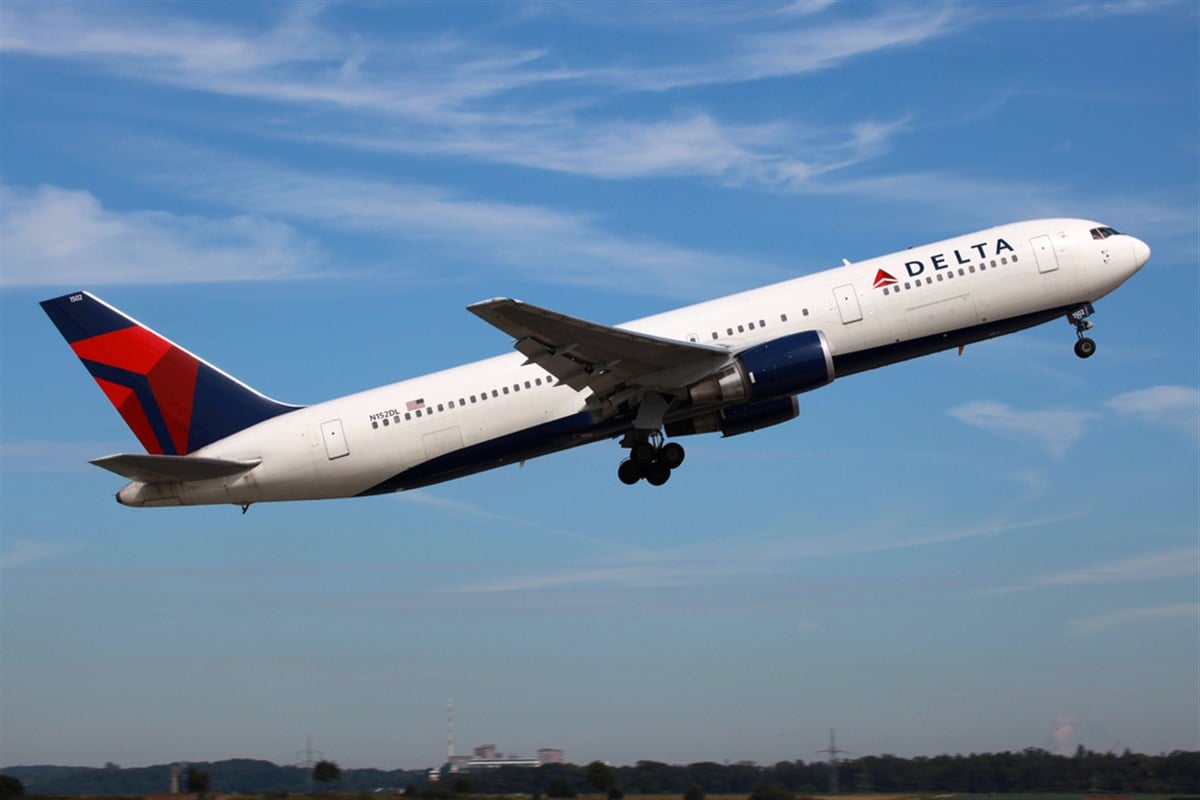Delta does a double-take: Clear skys or turbulence in 2024?

Delta Air Lines’ (NYSE: DAL) financial performance in 2023 could have been more consistent. The fourth quarter was record-breaking, demonstrating the company’s operational efficiency and strategic foresight. However, this success is tempered by a conservative outlook for 2024, underscoring the complex dynamics in the aviation and transportation sector and leading to a downward adjustment in Delta’s stock price. Some analysts are questioning whether Delta’s stock is still a buy, so let’s take a closer look at Delta’s 2024 strategy.
A closer look at the profits
Delta’s strong showing in international travel was a major source of profit. The company capitalized on pent-up demand for international travel, a smart move that paid dividends. Passenger traffic on these routes took off, indicating a renewed interest in global travel following the pandemic. Delta’s expansion of its network, particularly in premium cabins, was a well-calculated move that yielded significant benefits for the company’s bottom line. These cabins, known for their superior comfort and amenities, saw a substantial increase in sales, demonstrating consumers’ willingness to pay for a better travel experience.
The challenges ahead
Despite its successes, Delta faces several challenges that have prompted it to adopt a cautious stance for 2024. The airline industry is notoriously unstable, and fluctuating operational costs are a significant concern. Fuel prices are always a wild card in the aviation sector, and rising labor costs have begun to eat into Delta’s profit margins. Additionally, aircraft repair supply chain disruptions have caused logistical difficulties and increased maintenance expenses. These factors and the unpredictable nature of global economic conditions have necessitated a more conservative approach to the company’s 2024 financial projections.
Soaring ambitions amidst headwinds
Delta Air Lines’ performance in the fourth quarter of 2023 blended soaring achievements and emerging challenges. The company’s strategic decisions, particularly in international market expansion and premium cabin offerings, paid off with a significant revenue increase.
The upswing in international travel
Delta’s focus on international routes was a strategic masterstroke. The company capitalized on the global rebound in travel demand, particularly in premium segments. This focus provided a revenue boost and helped diversify its revenue streams, reducing reliance on more volatile domestic markets.
Navigating the challenges
Reviewing Delta Air Line’s financials shows that operational costs, a long-standing issue in the aviation industry, have become a major obstacle. The constant growth of fuel and labor expenses and supply chain problems in aircraft maintenance strained the company’s profit margins. The domestic market, characterized by fierce competition and fare reductions, added another layer of complexity. Delta’s response, which is marked by a cautious 2024 outlook, demonstrates its dedication to long-term stability over short-term gains.
Strategic Fleet Expansion
The purchase of 20 Airbus (OTCMKTS: EADSY) A350-1000 aircraft has been a hot topic in Delta’s news, and it is seen as a strategic move that aligns with the company’s focus on operational efficiency and market expansion. These aircraft, known for their fuel efficiency, will help reduce operating costs while opening avenues for increased cargo revenue. This decision underscores Delta’s adaptability and foresight in a rapidly evolving aviation landscape.
Delta’s strategies for 2024’s turbulence
As Delta Air Lines prepares for 2024, the company faces the potential of significant challenges. Rising operational costs and supply chain challenges are at the forefront of its strategic planning.
Emphasizing cost containment
Cost management is a crucial aspect of Delta’s strategy for 2024. This involves optimizing fleet utilization, including strategically deploying fuel-efficient aircraft and potentially retiring older, less economical models. Streamlining internal processes and renegotiating supplier contracts are other avenues the company is exploring to keep costs in check.
A future-ready fleet
Incorporating Airbus A350-1000 jets into Delta’s fleet is a forward-thinking move. These fuel-efficient jets have larger cargo capacities, opening new revenue channels. The extended range of these aircraft also allows Delta to explore new long-haul routes, further solidifying its competitive edge in the international market.
Sustainability and technology as pillars
Beyond immediate cost considerations, Delta is positioning itself as a sustainability and technological innovation leader. Delta’s ESG scores need improvement, and the company is looking toward investments in alternative fuels and carbon offset programs to reflect its commitment to environmental responsibility. Exploring advanced data analytics and automation technologies will further optimize operations and enhance passenger experiences.
Navigating external factors
However, external factors like global economic conditions and industry trends significantly influence Delta’s future success. Fluctuating fuel prices and potential economic downturns can disrupt Delta’s strategic plans. Therefore, maintaining flexibility and market awareness will be crucial for the airline to navigate the uncertain times ahead.
Analyzing soaring highs and potential dips
Delta Air Lines stands at a crucial juncture, with opportunities and challenges shaping its future trajectory.
Strengths and opportunities
Delta’s strengths are numerous: a strong international network, a modern, fuel-efficient fleet, and a solid reputation for customer service. The company’s strategic focus on operational efficiency and network optimization continues to be a competitive advantage. The opportunities, such as the potential for increased cargo revenue and leveraging sustainability initiatives, present avenues for growth and differentiation in a crowded market.
Weaknesses and threats
However, weaknesses such as cost pressures and reliance on volatile international markets must be addressed. The domestic market’s oversupply and intense competition pose additional challenges. External threats, including economic downturns and fluctuating fuel prices, add to the complexity of Delta’s operating environment.
Delta Air Lines enters 2024 with strategic successes and looming challenges. Its legacy of resilience, strategic market positioning, and proactive investments in technology and sustainability position it well for future success. However, the airline must deftly navigate rising operational costs, supply chain disruptions, and global market uncertainties. Delta’s adaptability, strategic planning, and ability to balance immediate challenges with long-term vision will be key in maintaining its leadership position in the volatile aviation industry.
https://www.entrepreneur.com/finance/delta-does-a-double-take-clear-skys-or-turbulence-in-2024/468293